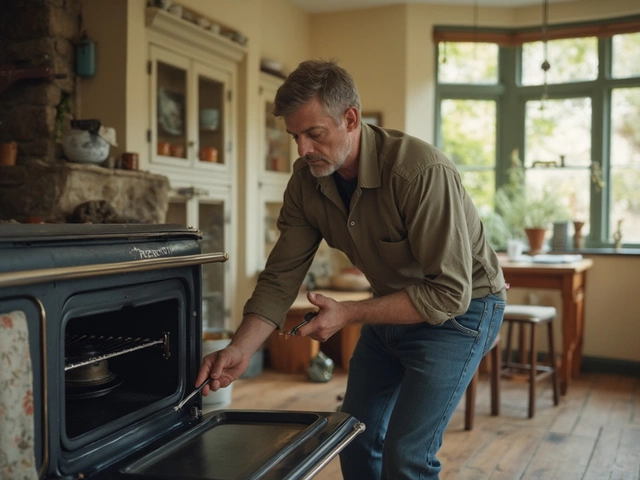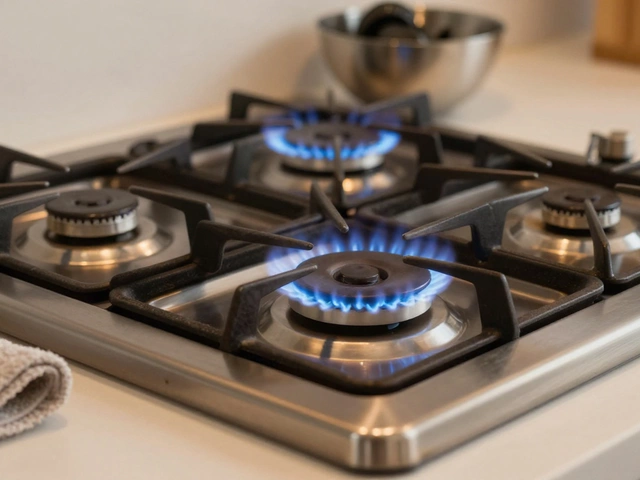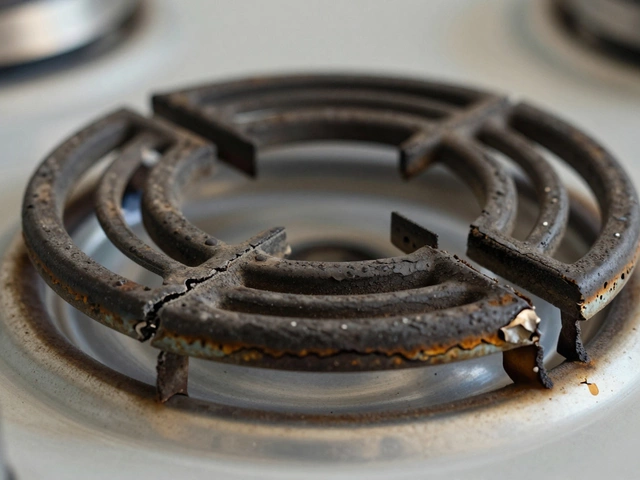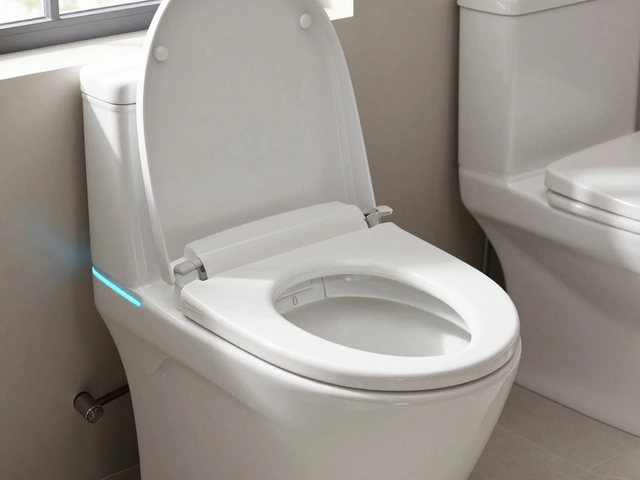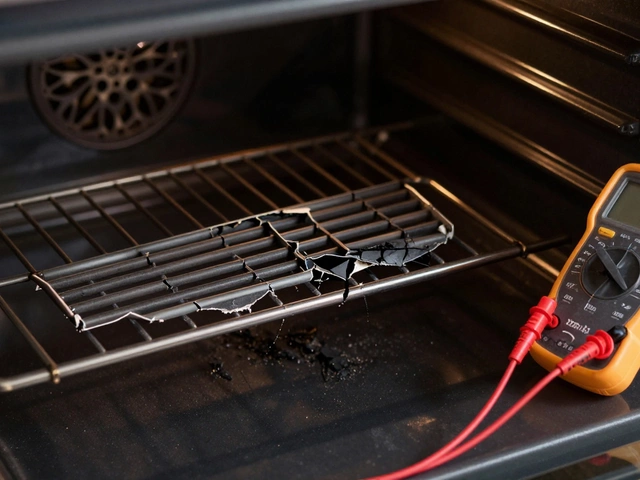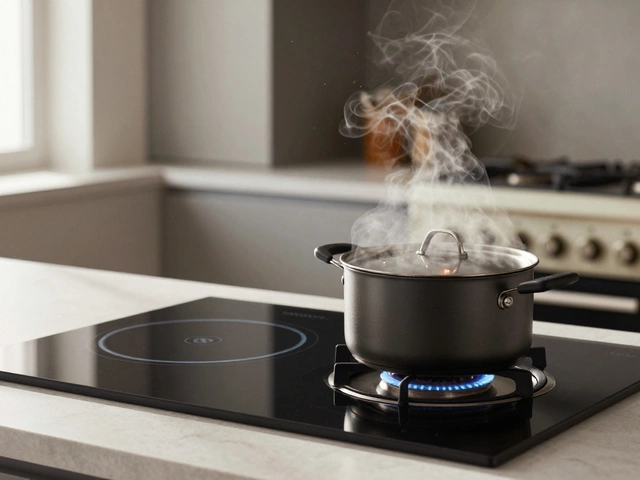Replacing an electric oven might sound like a manageable task, especially with instructional videos making it look so simple. Before you dive in, though, it's essential to take a step back and consider a few things. Ovens are powerful appliances that rely heavily on electrical systems to function properly. When replacing one, you'll need to deal with wiring, voltage, and potentially intricate connections.
Now, that's not to say you can't handle it yourself—but there are risks involved. An electric shock, damaging the appliance, or even posing safety hazards in your home could be consequences of an improperly installed oven. Of course, hiring a professional electrician comes with its own set of advantages, providing peace of mind and ensuring everything is up to code. Let's explore the key factors you should consider before making your decision.
- Understanding Your Oven's Electrical Needs
- Assessing Your Own Skill Level
- Risks of DIY Oven Replacement
- Benefits of Hiring an Electrician
- Cost Implications
- Safety and Code Compliance
Understanding Your Oven's Electrical Needs
Electric ovens are heartbeats in many kitchens, not just for the warm meals they assist in preparing, but for their efficient operation, which relies heavily on stable electrical systems. At the core, the role of electricity in an oven is simple enough—it powers the heating elements and any electronic features such as dials or digital interfaces. Yet, behind that simplicity lies an intricate network of wires and connections that require comprehension to ensure both effective and safe appliance operation. First off, many modern ovens require a dedicated circuit of their own, as they need a hefty amount of power, often between 30 to 50 amps. Wiring an oven like this into an already burdened circuit could trip breakers or, worse, lead to overheating and potential fire hazards. Understanding this basic necessity is crucial for any homeowner considering a DIY installation.
Moreover, the voltage needs of ovens are not uniform across all models. Some ovens work on a standard 240-volt circuit, while smaller wall ovens may operate comfortably within 120 volts systems. Knowing your model's specifications is essential not only for acquiring the correct wiring but also for selecting compatible breakers and ensuring your existing setup can support the oven without hiccups. Each oven should be installed according to the manufacturers’ guidelines, which have been designed to improve performance while ensuring safety. Consciously overlooking these instructions might not only undercut the appliance's efficiency but also void its warranty.
For those still feeling adventurous, it's important to factor in the state of your current wiring. Older homes sometimes feature outdated wiring systems that aren’t compatible with new high-efficiency ovens. Before embarking on an installation journey, it’s a good idea to have the wiring inspected by a professional to avoid potential hazards. This is common advice shared by many, including the National Fire Protection Association, who emphasize the need for regular inspections.
“The introduction of highly advanced kitchen appliances has heightened the demand for robust electrical frameworks in residential units,” says John Drengenberg, Consumer Safety Director at UL.This highlights the deepening complexity one must be prepared to handle.
Preparing properly also means having a clear understanding of local electrical codes and regulations. Each locale might have its own standards for how electrical systems should be set up or retrofitted, especially when new appliances are introduced. Complying with these codes is not just a matter of safety; it is often required by law, and failing to adhere may result in fines or complications in the event of property sale. An oven installation might require a permit in some regions, and checking with local authorities before proceeding is a wise step to take. Ultimately, whether hiring a professional or doing it yourself, understanding the *electric oven*'s electrical demands unlocks the doorway to a successful, and safe, installation experience.
Assessing Your Own Skill Level
When considering whether to replace your electric oven yourself, it’s vital to take a moment to honestly assess your own skill level. You might be a whiz at DIY projects, but dealing with electrics calls for more than just enthusiasm. Electric ovens aren't just plug-and-play devices; they require precise connections to high-voltage wires that can be a bit tricky to manage. Understanding the process means having a grip on basic electrical terminology and being able to navigate wiring diagrams with some degree of confidence. If terms like 'amperage' and 'circuit breakers' feel foreign, it might be time to reconsider.
This isn’t about discouraging your DIY spirit but rather ensuring safety and functionality. Electricians typically have years of training and hands-on experience which prepares them for the unexpected quirks of individual electrical systems. They are well-versed in local regulations and safety codes which can be easily overlooked by someone unaccustomed to such details. Having an idea of the core principles of electricity and experience with home wiring projects goes a long way. Still, it's crucial to be mindful of the limits of your expertise.
You need some specialized tools as well, like a multimeter and a voltage detector. These are used to test the electrical current and ensure everything is working as it should be without shorts or surges. Do you have these tools on hand, and more importantly, do you know how to use them effectively? It’s one thing to have a full box of tools; it's another to wield them with precision and safety in mind. It's essential to be equipped with knowledge, tools, and a keen sense of safety.
"Even if you think you can handle it, an expert can make the installation look easy while ensuring there are no hidden hazards," says famed home repair author Mike Holmes.
Remember, the key here isn’t just about knowing how to wire things, but ensuring that everything works seamlessly without risk to you or your home. If at any point you're uncertain, pausing to consider getting expert help might just be the best decision you can make. Take a look at your past projects. Have you tackled something similar before, or is this venturing into new territory? Being calm and grounded in your capabilities will guide you to the right choice.
Consider documenting the current setup of your oven before uninstalling it. A quick sketch or photo of the existing wiring can aid you tremendously when it comes time to install the new unit. Yet, if the wires appear worn or if you observe anything suspect, this is a classic sign to seek advice from an electrician. They are trained to spot things that might be invisible to the untrained eye, like subtle signs of wear or dangerous degradation.
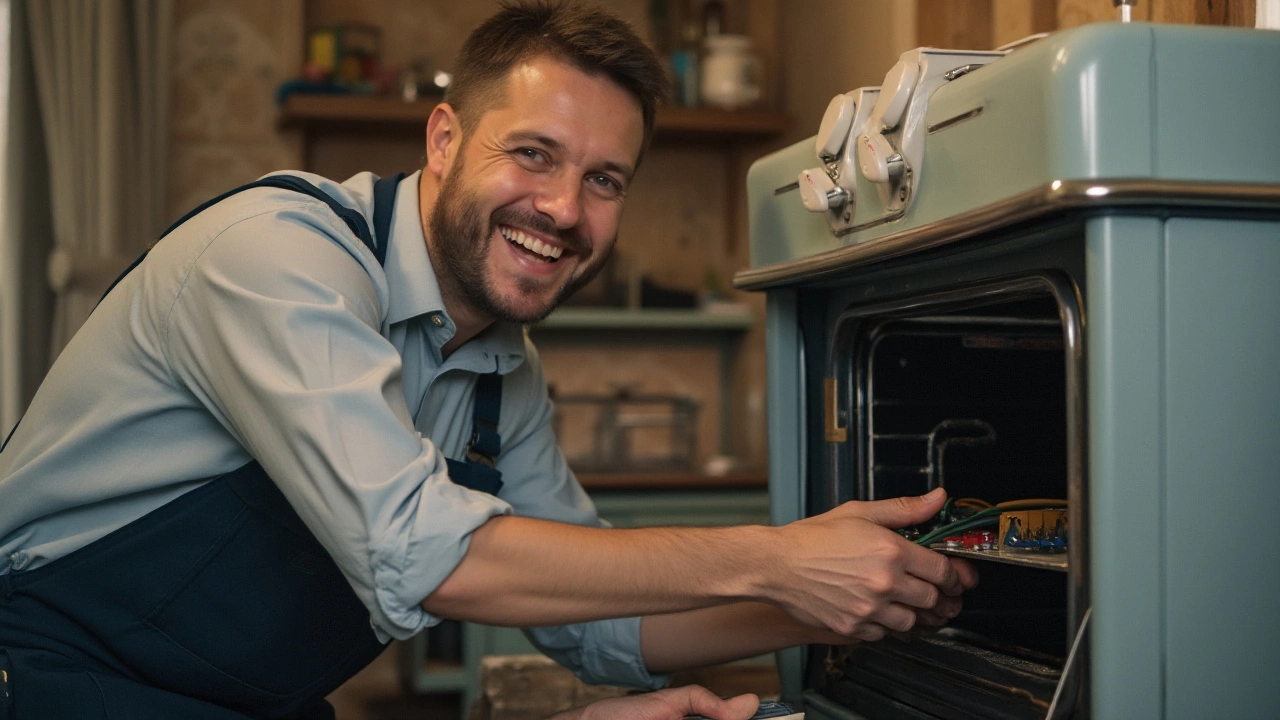
Risks of DIY Oven Replacement
Diving into the world of *electric oven* replacement without the expertise of a professional can be a decision fraught with potential hazards. First and foremost, the primary concern revolves around the risk of electrical shock. Handling high-voltage connections is inherently dangerous, and without the proper precautions and knowledge, you could find yourself in a risky situation. Many might not realize, but an oven involves more complex wiring than other home electrical devices. It's not just about connecting wires; it's about ensuring these connections carry the right voltage without posing a threat to your safety.
Another significant risk of replacing your *electric oven* is the potential for improper installation, which could lead to malfunctioning. You may encounter unexpected issues down the line, such as blown fuses or damaged outlets, which could have been avoided had the installation been done correctly from the start. It is crucial to ensure all connections are secure and properly insulated, preventing short circuits that could harm both the appliance and other electrical systems in your home.
While cost-saving might seem like the immediate benefit of a DIY approach, errors can quickly rack up expenses with repair costs. For instance, you might inadvertently void any existing warranties or cause damage that requires calling in a professional repair service, thus negating any initial savings. Incorrect installations might also eventually lead to increased energy consumption. Faulty connections can result in the oven pulling more power than necessary, leading to spikes in your electricity bill.
An often overlooked risk is that of fire hazards. Electrical fires can occur from inadequate installations when wires are not appropriately connected or insulated. According to the National Fire Protection Association, electrical distribution and lighting equipment are involved in more than 45,000 home fires annually. A poorly installed oven could add to these statistics. As a renowned source notes, "In the zeal for self-sufficiency, one must not overlook the paramount importance of safety over savings."
Electrical safety experts frequently stress that the cost of a professional electrician is just a fraction of the potential damage caused by electrical mishandling.
Unforeseen Code Violations
Finally, DIY enthusiasts might not be fully versed in local building codes and regulations, which are integral to home safety and insurance policies. Installing an oven that doesn’t meet local electrical codes might turn into a costly mistake. You could face fines during an inspection, or worst-case scenario, struggle with insurance claims in the event of fire or damage. Understanding and applying these codes is a forward-thinking approach to install efficiency and safety. Homeowners should truly consider whether they are comfortable undertaking an activity that requires not just electrical expertise, but an understanding of local compliance too.Benefits of Hiring an Electrician
Taking on the challenge of replacing an electric oven by yourself can be an exciting yet daunting task. However, the benefits of hiring a professional electrician often outweigh the allure of a DIY project. Electricians bring a wealth of expertise to the table. They've honed their skills through years of training, equipped themselves with an understanding of complex electrical systems, and stay updated about the latest safety regulations and technological advancements. This means that when they handle your oven replacement, they do so with precision and care.
One of the most compelling reasons to consider hiring an electrician is safety. Electric ovens require substantial power and are connected directly to the house's electrical system. Any mistake while dealing with this intense wiring could lead to electrical shocks or even a fire hazard. Your family's safety and well-being is surely worth the investment of a qualified professional.
“An ounce of prevention is worth a pound of cure,” as Benjamin Franklin wisely put it. Consulting with an electrician is preventive risk management at its finest.
Moreover, electricians are familiar with local building codes and regulations. These legal considerations are not merely bureaucratic hurdles; they are designed to ensure that installations are safe and reliable. Hiring a licensed electrician guarantees that your oven is installed in compliance with all codes, which is crucial, especially if you plan to sell your home in the future. An incorrectly installed appliance can become a major deal-breaker during home inspections.
Time is another key reason to entrust this job to a professional. While it may take you hours or even an entire weekend to grasp the intricacies of installing an electric oven, an electrician can complete the task efficiently. They arrive equipped with the right tools and experience, allowing them to work swiftly, minimizing downtime and inconvenience for you and your family. Plus, you'll be spared from the frustration and potential mishaps of navigating this task solo.
It's also valuable to note the warranty aspect. Many electric ovens come with warranties that may be voided if the installation is not carried out by a certified professional. This alone could be a significant factor in deciding whether to hire an electrician. By ensuring proper installation, you preserve these warranties, offering peace of mind knowing that you're covered if any issues should arise with the appliance.
Consider also the financial side of this decision. At first glance, paying for an electrician might seem like an extra, unwelcome expense. However, incorrect self-installation can lead to costly damages or repairs down the road. By investing in professional services upfront, you can prevent these unforeseen expenses from coming your way, making it a smarter financial choice in the long run.
Finally, the greatest advantage is perhaps intangible: the reassurance that comes from knowing the job is done right. With an experienced electrician handling your oven replacement, you can rest assured, knowing that your appliance is installed securely and professionally. This peace of mind is invaluable, saving you from potential accidents or life-threatening mishaps.
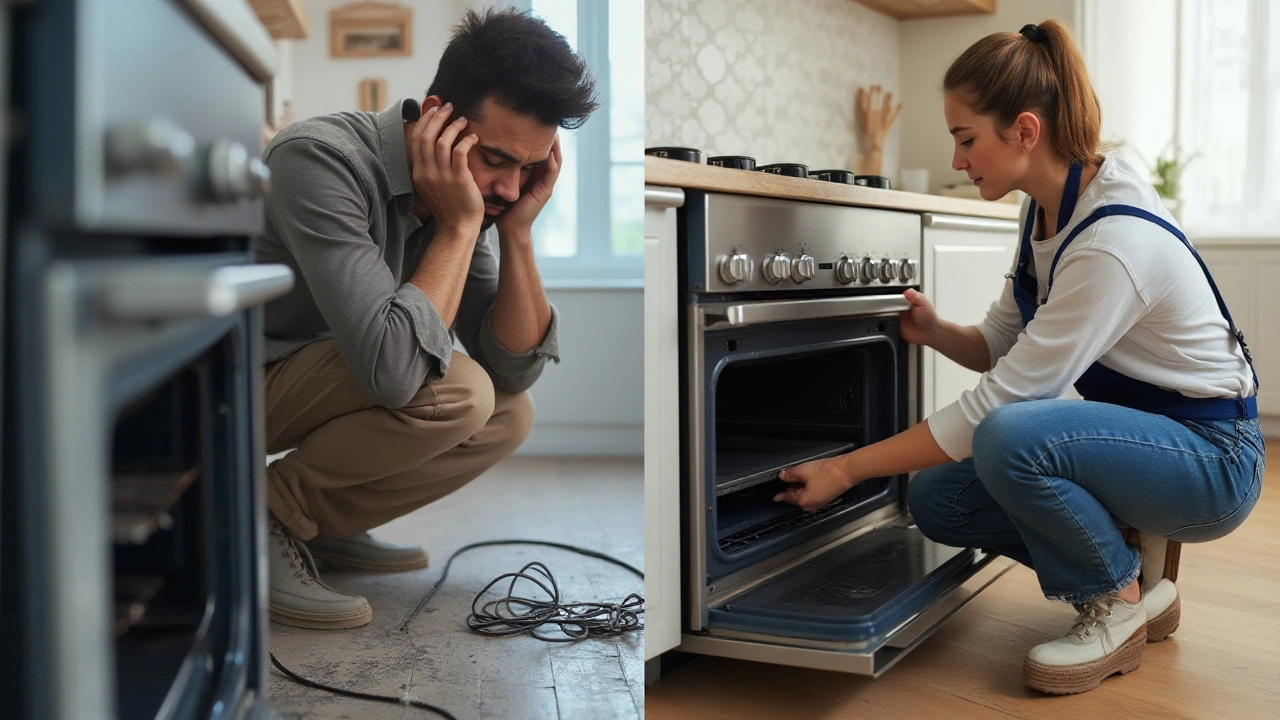
Cost Implications
When determining whether to hire a professional electrician or to take the DIY route for replacing your electric oven, understanding the cost implications is crucial. The financial aspect isn't just about the upfront money you'll spend but also the potential hidden costs that might arise from an improper installation. Hiring an electrician can sometimes feel like a steep expense, with prices ranging anywhere from $100 to $500 for installation services, based on your location and the complexity of the job.
Now, you might be thinking about the savings you'd pocket by avoiding those fees. However, this can be a double-edged sword. Without the qualified assistance of an electrician, there's a risk of errors during installation, which may lead to appliance damage or even personal injury. An improperly installed oven might malfunction, causing significant long-term costs. Repairs on such damages can easily surpass the initial savings from not hiring a professional in the first place.
There are costs associated with purchasing the necessary tools and equipment, if you don't already have them at hand. Consider the expenses for multimeters, wire cutters, and other electrical tools, not to mention the time commitment required to learn and perform this task correctly. Time, after all, is money, and investing a large chunk of your day in oven installation could be spent on other productive activities or, for some, simply enjoying a day off with family.
"In the realm of electrical repairs and installations, ensuring safety while saving costs remains a delicate balance, especially as the national average cost for repair services keeps soaring," as noted by HomeAdvisor's latest 2024 Home Services Report.
A professional electrician brings expertise and efficiency to the table. They're more likely to finish the job swiftly, reducing the downtime of an unusable oven. Electricians also ensure that your installation is up to code, which can prevent costly future repairs or fines. It's worthwhile to also consider the potential increase in energy efficiency with a correctly installed appliance, which could save on electricity costs in the long run.
Then there's the peace of mind aspect. The knowledge that your appliance is safely and efficiently installed translates to less stress in your daily life. Although placing a dollar value on peace of mind can be tricky, it certainly counts in the final analysis of costs and benefits. By entrusting the installation of your oven to a professional, you not only safeguard your home’s electrical system but also ensure that your warranty remains valid, as many manufacturers require professional installation for the warranty to be upheld.
Safety and Code Compliance
When it comes to electric ovens, safety and code compliance are not just buzzwords; they are essential aspects that can affect the safety of your home. An electric oven is a powerful appliance that requires a proper electrical connection to avoid risks like electrical fires or shock hazards. Complying with local electrical codes ensures that your oven is installed correctly and can prevent potential issues down the line. It's important to understand that these codes are established for a reason, focusing on ensuring the safety and integrity of the electrical systems in residential homes.
Before diving into your oven replacement project, it’s crucial to understand the limits of your current electrical system. Older homes may not have circuits that can handle the high electricity demands of modern ovens. It’s often necessary to verify that your home’s existing wiring can support the new oven’s specifications. A professional electrician has the expertise to assess and potentially upgrade your system to meet the standards safely. This step can save you from dangerous situations and costly repairs down the road caused by overloaded systems.
Many localities require that large appliances, such as electric ovens, be connected by a licensed electrician. This is often part of building codes to keep homeowners safe. Hiring a professional ensures that the installation is inspected and compliant with these legal regulations. Ignoring these can not only void your warranty but might also result in fines or reduced home insurance coverage. According to the Electrical Safety Foundation International (ESFI), electrical distribution systems are the third leading cause of home structure fires, which highlights the importance of careful installation.
"Electrical safety codes prevent countless hazards and ensure the security of home residents," said Brett Brenner, ESFI President.
In some states, DIY installations on electrical systems in homes are not permitted and could lead to penalties if discovered. It’s certainly worth researching whether your locality enforces these types of rules. Safety isn't just about following rules but understanding the reasons behind them. Ensuring that each installation, including that of a new electric oven, is up to code protects you and your home from electrical accidents. By choosing to hire a licensed electrician, you equip yourself with the assurance that your appliance is not just a functional addition but a safe one, too.
Sometimes people can overlook the logistical components involved in the replacement of an oven. Ensuring proper grounding and the use of the right circuit breakers are tasks that require technical knowledge and experience. Improper installation can increase the risk of oven malfunctions, which can be dangerous. When thinking over whether to hire a professional, remember the peace of mind that comes with knowing the appliance was installed correctly, compliant with all safety measures, and legally secure. It’s a small step that can play a significant role in safeguarding your home and its occupants.



